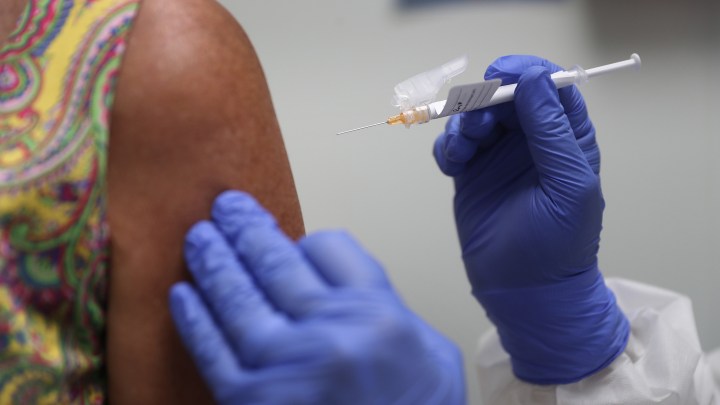
Researchers work to diversify clinical trials of COVID-19 vaccine
Researchers work to diversify clinical trials of COVID-19 vaccine

Pfizer has announced it saw good early data on results for a COVID-19 vaccine. But once a vaccine is fully tested and ready to distribute, will people be willing to get it?
A recent poll from the Kaiser Family Foundation and ESPN’s The Undefeated found that nearly half of Black adults and 37% of Latinx adults said they wouldn’t take a coronavirus vaccine, even if scientists recommend it, and it’s free.
Getting Black and Latinx communities to participate in medical research means overcoming decades of mistrust, but it’s crucial for making a product that people have faith in.
Dr. Valeria Cantos is recruiting people from the Latinx community to test a COVID-19 vaccine by drug-maker Moderna at Emory University in Atlanta.
There are some questions she gets a lot: “’You’re not going to share this information with immigration are you?’ or ‘Can I still participate if I don’t have a Social Security number?’ implying that they may be undocumented,” she said.
Cantos, who’s Latina, explains that privacy rules protect research participants, regardless of immigration status.
Cantos works at one of 100 research sites around the country testing Moderna’s vaccine.
“Our goal is to have a vaccine that has been tested in the population that is the most vulnerable to becoming infected with COVID,” she said.
The Centers for Disease Control and Prevention says Black, Latinx and Native American people are more likely to be hospitalized and die from coronavirus infection.
Emory’s research budget has specific funds dedicated to reaching out to Black and Latinx communities. And it’s paid off: Most of the participants at the research site run by Dr. Colleen Kelley are from those groups.
“If we have a very homogenous white population involved in our clinical trials, that creates a lot of uncertainty but also mistrust around the results and how they might apply to Black and Latinx populations,” Kelley said.
That mistrust has been built over centuries from when slavery started in the colonies that became the U.S., said Dr. James Hildreth, president of the historically Black Meharry Medical College in Nashville.
“The truth is going all the way back to 1619 there is a history of atrocities being visited upon Black bodies in the service of medical research,” Hildreth said.
Hildreth is trying to broadcast his trust in research by publicly participating in a COVID-19 vaccine trial. He said people need to have faith in the vaccines to get them if they become widely available, because vaccines don’t save lives, vaccinations do.
There’s a lot happening in the world. Through it all, Marketplace is here for you.
You rely on Marketplace to break down the world’s events and tell you how it affects you in a fact-based, approachable way. We rely on your financial support to keep making that possible.
Your donation today powers the independent journalism that you rely on. For just $5/month, you can help sustain Marketplace so we can keep reporting on the things that matter to you.


















